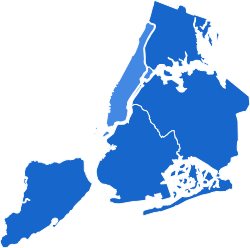| |||||||||||||||||||
| Registered | 2,345,001 | ||||||||||||||||||
|---|---|---|---|---|---|---|---|---|---|---|---|---|---|---|---|---|---|---|---|
| Turnout | 1,305,368 55.67% ( | ||||||||||||||||||
| |||||||||||||||||||
 Borough results Koch: 60–70% 70–80% | |||||||||||||||||||
| |||||||||||||||||||
| Elections in New York City |
|---|
 |
The 1981 New York City mayoral election occurred on Tuesday, November 3, 1981, with Democratic incumbent Mayor Ed Koch being re-elected to a second term by a landslide margin.
Contents
- Democratic primary
- Candidates
- Republican primary
- Candidates 2
- General election
- Candidates 3
- Results
- References
Koch won both the Democratic and Republican nominations and appeared on the ballot with both of their lines. He only faced opposition from third parties in the election. [1]
Koch received an overwhelming 74.64% of the vote citywide. Koch also swept all five boroughs by landslide margins, breaking 60% of the vote in Manhattan and breaking 70% of the vote in Brooklyn, the Bronx, Queens and Staten Island. [2] Koch's closest competitor was the short-lived New York Unity Party nominee Frank J. Barbaro, who received 13.31%. Finishing in a distant third and fourth were the Conservative Party nominee, John A. Esposito, who received 4.92%, and Liberal Party nominee, Mary T. Codd, who received 3.41%.

